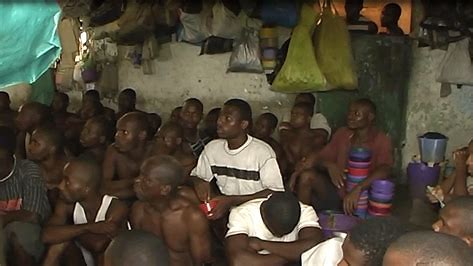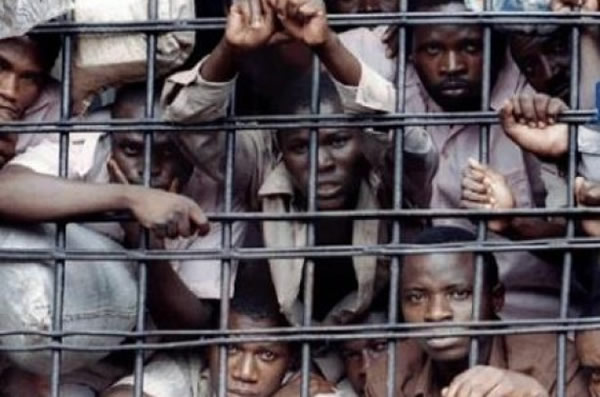


UNFIT FOR HUMAN BEING:
Prison Welfare Initiative Founder, Dr. NATHANIEL OYINLOYE blasts Nigerian Government for 4,068 Inmates’ Release to public
*“I will like Nigerians to know that prisons for inmates in the country is unfit. And the obstacles to the Rehabilitation of prisons include Overcrowded Facilities, Inadequate Funding, Outdated Infrastructure; Staffing Challenges; Limited Educational Opportunities, Insufficient Healthcare; Corruption and Mismanagement”- OYINLOYE
*BY AHMED NURUDEEN/LAW ENFORCEMENT Correspondent, Lagos & RANTI AKERELE/ Senior JUDICIAL Editor, Abuja
IT WOULD BE RECALLED THAT as part of efforts to decongest the Nigerian Custodial Centres, the Minister of Interior, Dr Olubunmi Tunji-Ojo, initiated the release of 4,068 inmates who have served various terms of imprisonment with an option of fine or compensation recently. Faulting that approach is Dr. Nathaniel Oyinloye, Founder of Hospital and Prison Welfare Initiative (HPWI) Nigeria, South Africa, USA & Hospital and Prison Action Network (HPAN), United Kingdom, UK.
In a paper titled: ‘Challenges in Rehabilitating Inmates: A Closer Look at Nigeria’s Correctional Services’, Oyinloye explained that the rehabilitation of offenders within Nigeria’s correctional services face a myriad of challenges that impede the successful reintegration of individuals into society. These challenges span various aspects of the correctional system, hindering its ability to fulfill its intended purpose.
He listed the challenges below and enumerated in detail what causes the problem:
* Overcrowded Facilities:
Nigerian correctional facilities grapple with severe overcrowding, a critical issue that compromises the safety and efficacy of rehabilitation programs. Overcrowded conditions not only strain resources but also limit the personalized attention and support that inmates require for successful rehabilitation.
*Inadequate Funding:
Insufficient financial resources allocated to correctional services have far-reaching consequences. The lack of funding affects the quality of infrastructure, staff training, and rehabilitation initiatives, hindering the development of comprehensive programs aimed at addressing the diverse needs of inmates.
* Outdated Infrastructure:
Many correctional facilities in Nigeria suffer from outdated infrastructure, making it challenging to implement modern and effective rehabilitation strategies. The lack of appropriate facilities and technology limits the delivery of educational and vocational programs essential for inmate reintegration.
* Staffing Challenges:
Understaffing and inadequate training of correctional officers pose significant challenges to the effective management and rehabilitation of inmates. A well-trained and adequate workforce is essential for implementing rehabilitation programs and maintaining a secure environment within correctional facilities.
* Limited Educational Opportunities:
Inmates often lack access to quality educational programs, restricting their ability to acquire new skills and knowledge. Education is a key component of rehabilitation, empowering individuals to break the cycle of criminality and pursue lawful livelihoods upon release.
* Insufficient Healthcare:
Inadequate healthcare services within correctional facilities impact the physical and mental well-being of inmates. Access to proper medical care is crucial for addressing the health challenges of the incarcerated population and supporting their overall rehabilitation.
*Limited Vocational Training:
The scarcity of vocational training programs diminishes opportunities for inmates to acquire practical skills. Vocational training is instrumental in preparing individuals for employment post-release, reducing the likelihood of recidivism.
* Corruption and Mismanagement:
Instances of corruption and mismanagement divert resources away from rehabilitation efforts. Addressing issues of corruption within the correctional system is vital to ensuring that funds and efforts are directed toward effective rehabilitation programs.
* Legal and Policy Gaps:
The absence of comprehensive and up-to-date legal frameworks and policies related to rehabilitation creates gaps in the correctional services system. Clear and robust legislation is essential for guiding rehabilitation efforts and ensuring a cohesive approach toward inmate reintegration.
* Limited Reentry Support:
Inmates often face challenges in accessing post-release support, including housing, employment assistance, and community reintegration programs. Strengthening reentry support mechanisms is crucial for facilitating a smooth transition from incarceration to productive citizenship.
According to this scholar, addressing these challenges requires a concerted effort from policymakers, correctional authorities, and society at large. By investing in rehabilitation initiatives and addressing systemic issues, Nigeria’s correctional services can work towards creating a more effective and humane system that contributes to the successful reintegration of individuals into society.
Nathaniel further gave 10 reasons why Nigeria correctional services are not fit for purpose and unable to deliver proper rehabilitation:
1. Overcrowded Facilities: Many Nigerian correctional facilities are overcrowded, compromising the safety, security, and overall effectiveness of rehabilitation programs.
2. Inadequate Funding: Insufficient financial resources allocated to correctional services result in a lack of essential infrastructure, staff training, and rehabilitation resources.
3. Outdated Infrastructure: Many correctional facilities suffer from outdated infrastructure, limiting their capacity to provide modern and effective rehabilitation services.
4. Staffing Challenges: Understaffing and inadequate training of correctional officers may hinder their ability to manage and rehabilitate inmates effectively.
5. Limited Educational Opportunities: Inmates often lack access to quality educational programs, hindering their ability to acquire skills that would facilitate reintegration into society.
6. Inadequate Healthcare: Health services within correctional facilities may be subpar, impacting inmates’ physical and mental well-being and hindering successful rehabilitation.
7. Insufficient Vocational Training: Lack of vocational training programs reduces opportunities for inmates to acquire practical skills, diminishing their chances of employment upon release.
8. Corruption and Mismanagement: Instances of corruption and mismanagement within correctional services can divert resources away from rehabilitation efforts, undermining the system’s overall purpose.
9. Limited Reentry Support: Inmates often face challenges in accessing post-release support, including housing, employment assistance, and community reintegration programs.
10. Legal and Policy Gaps: The absence of comprehensive and up-to-date legal frameworks and policies related to rehabilitation may create gaps in the correctional services system, impeding its ability to fulfill its intended purpose.
SUPPORT OUR INVESTIGATIVE JOURNALISTS & JOURNALISM:
CERTAINLY, Good journalism costs a lot of money. Without doubt, only good journalism can ensure the possibility of a good society, an accountable democracy, and a transparent government. We are ready to hold every corrupt government accountable to the citizens. To continually enjoy free access to the best investigative journalism in Nigeria, we are requesting of you to consider making a modest support to this noble endeavor.”
By contributing to NAIJA STANDARD NEWSPAPER, you are helping to sustain a journalism of relevance and ensuring it remains free and available to all without fear or favor.
Your donation is voluntary — please decide how much and how often you want to give. For offline donation, email: letters@nigeriastandardnewspaper.com or call +2348037128048 (Nigeria) or +16825834890 (United States of America)



